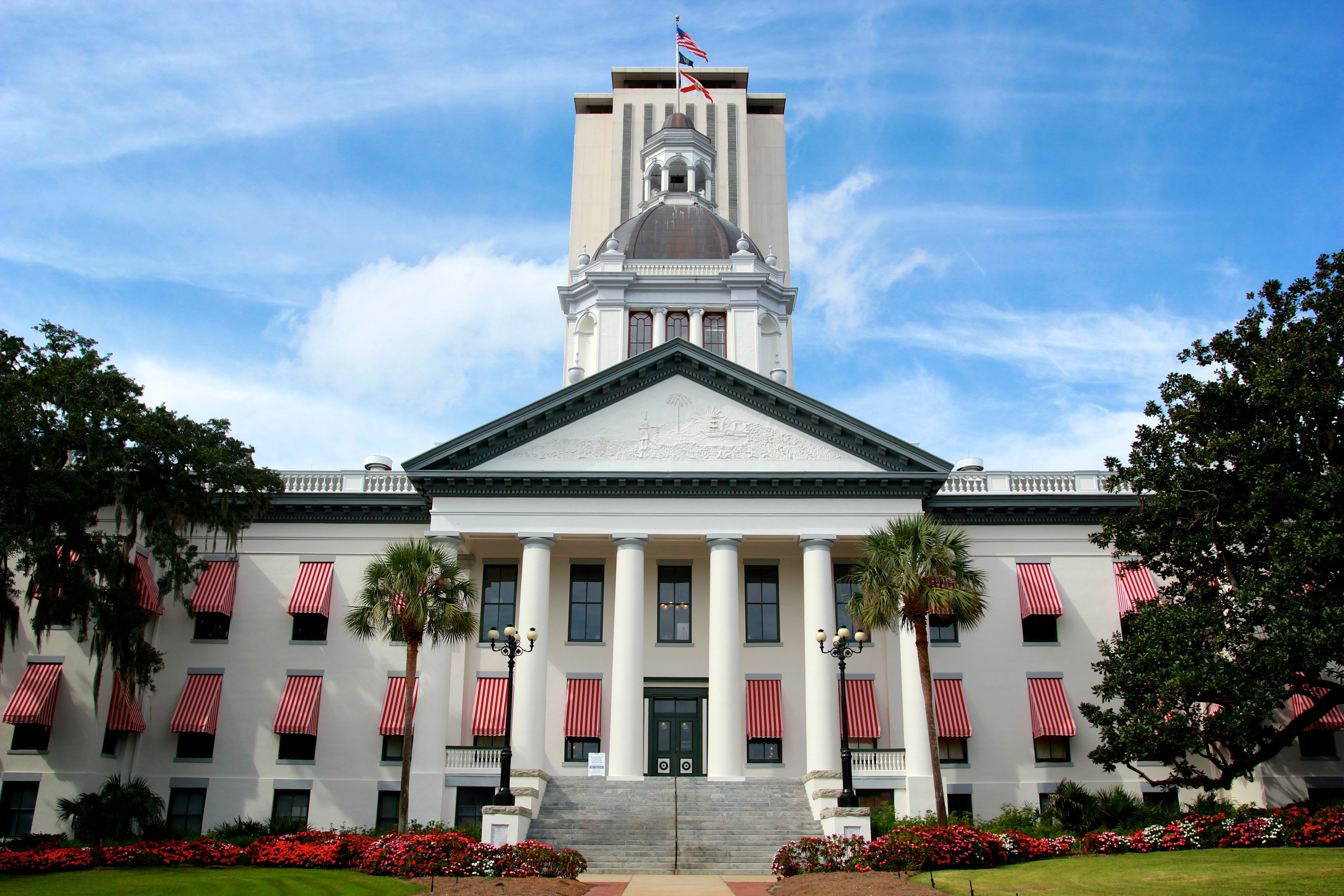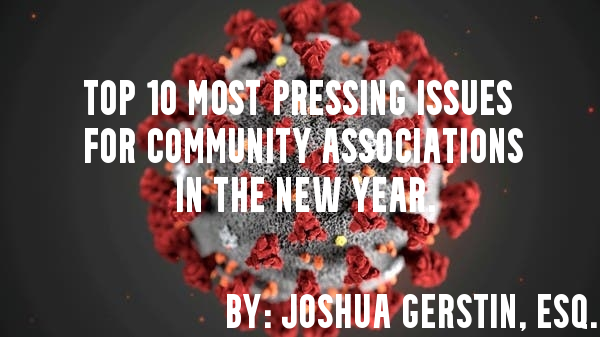
Another big year for legislation impacting Florida’s community associations. Now is the time for associations to contact their attorneys for guidance. The following items will become law on July 1, 2021, unless vetoed by the Governor. Following is a summary of the highlights. For complete coverage, please click on the various links below to see the bill’s entire text:
Condominiums- SB 630 (available by clicking here):
1. **Collections have changed. See below for important information. Similar to homeowner associations. Condominium association collections require two forty-five-day notices from an attorney compared to the prior two thirty-day notices (SB 56available by clicking here).
2. Renters have the right to inspect and copy only the declaration of condominium, by-laws, and rules.
3. Requiring members to demonstrate any purpose or state any reason for a record inspection is prohibited.
4. Documents required to be posted on a website can be made available via a mobile application (applies only to condominiums with 150 or more units).
5. For condominiums with 150 or more units, instead of posting copies of certain required documents to a website, the association may make those documents available through an application on a mobile device.
6. Discriminatory restrictions in governing documents (e.g., restrictions pertaining to race, color, national origin, religion, gender, or disability) can be amended by the Board without the necessity of a vote by the members.
7. Board member term limits are clarified as beginning on or after July 1, 2018.
8. If condominium association policies do not allow for subrogation against an owner, an owner’s policy cannot allow for subrogation against an association. This bill may have unintended and expensive consequences in the form of higher insurance rates if association insurers cannot recoup losses against a negligent owner.
9. Bids have to be maintained by an association for only one year.
10. Transfer fee maximum amount is increased from $100.00 to $150.00 and will have a CPI adjustment every five years.
11. Recall disputes may go directly to court or arbitration, mediation is no longer an option.
12. Contracts with a service provider owned or operated by a board member (or other relatives with a financial relationship) are no longer prohibited.
13. Associations cannot prohibit the installation of a natural gas fuel station. However, the installation must comply with all federal, state, and local laws.
14. An association can install, operate and charge for an electric vehicle charging station or natural gas fuel station on the common elements or association property. The installation of an electric vehicle charging station or natural gas fuel station will not constitute a material alteration or substantial addition to the common elements or association property.
15. The Division now has jurisdiction to investigate complaints related to association records.
16. Fines are due five days after notice to the violator compared to five days after the Fining Committee approved the fine.
17. Based on the advice of emergency management officials, licensed professionals retained by the association or public health officials, the Board may limit entry or occupancy of any portion of the condominium or association property to protect the health, safety, and/or welfare of the members, tenants, guests, and invitees.
18. During an emergency, the Board may use heightened sanitation protocols and remove debris to mitigate the spread of fungus, mold, or a contagion. In addition, the Board may contract for services or items that assist with the mitigation of damage, further injury, or the spreading of a contagion.
19. Emergency powers are limited to only the amount of time reasonably necessary to protect the health, safety, and/or welfare of members, guests, and invitees, mitigate further damage or injury or make necessary repairs.
20. An association no longer has to wait for a problem to occur. Emergency powers can be used in response to anticipated damage or injury. The term “contagion” was added to the types of emergencies.
21. An association’s emergency powers cannot be used to prohibit owners, tenants, guests, agents, or their invitees from accessing a unit, common elements, and limited common elements if access is necessary to facilitate the sale, lease, or transfer of title to the unit.
22. In response to a records request, condominium associations must provide the owner a certified and itemized list of records produced.
23. Fourteen days’ notice is required for all member meeting notices unless other stated in the association’s by-laws.
24. Service provider conflict of interest provisions have been deleted.
25. Fines are due 5 (five) days after notice from the association.
26. Unpaid fines are no longer considered a type of financial delinquency that would bar an owner from becoming a candidate for a directorship (SB 1966, available by clicking here).
Homeowner Associations- SB 630 (available by clicking here)
1. **Collections have changed. See below for important information.
2. Similar to condominium associations, amendments to homeowner association governing documents that prohibit or regulate rentals will apply only to owners acquiring title after the amendment is passed or to the existing owners that consent. Rental restrictions in a governing document amendment will not apply to owners that do not vote on the amendment or that vote no. Instead, the rental restrictions would apply only after the home is sold. A home transferred to an affiliated entity in which the beneficial ownership remains the same, or a home devised (transferred) through a will, does not give rise to the imposition of a rental restriction amendment. This new law does not apply to governing document amendments seeking to prohibit or regulate rentals for terms of less than six (6) months or seek to limit rentals to no more than three times a year. The new law also does not apply to a homeowners’ association with less than sixteen homes.
3. Records or other information obtained by a community association when a guest visits an owner or resident (security check at gated communities, etc.) are not accessible to members.
4. Rules & Regulations are no longer included in the definition of “governing documents.” The inclusion of Rules and Regulations in the definition was the reason homeowner associations started recording them. Considering the flip-flop nature of the legislature and that most Rules and Regulations have now been recorded, continuing to record new Rules and Regulations makes sense.
5. Sign-in sheets, ballots, voting proxies, and all other records pertaining to parcel owners’ voting must be maintained for one year after the vote.
6. If governing documents do not obligate the developer to create reserves, no reserves are accounted for in the budget, and the association is responsible for the repair and maintenance of
capital improvements for which a special assessment may be necessary, financial reports for the preceding year must contain disclosure language in conspicuous type.
7. Reserves are to be considered mandatory only if the governing documents obligated the developer to provide reserves or the reserve(s) are approved by a majority of the association’s total voting interests.
Applicable to both condominium and homeowner associations
1. **Collections SB 56 (available by clicking here):
An association may not require payment of attorney fees related to a past due assessment without first delivering a written notice of late assessment to the unit owner which specifies the amount owed to the association and provides the unit owner an opportunity to pay the amount owed without the assessment of attorney fees. The notice of late assessment must be sent by first-class United States mail to the unit owner at his or her last address as reflected in the association’s records and, if such address is not the unit address, must also be sent by first-class United States mail to the unit address. Notice is deemed to have been delivered upon mailing as required by this subsection. A rebuttable presumption that an association mailed a notice in accordance with this subsection is established if a board member, officer, or agent of the association, or a manager licensed under part VIII of chapter 346 468, provides a sworn affidavit attesting to such mailing. The notice must be in substantially the following form:
NOTICE OF LATE ASSESSMENT
RE: Unit …. of …(name of association)…
The following amounts are currently due on your account to …(name of association)…, and must be paid within 30 days of the date of this letter. This letter shall serve as the association’s notice of its intent to proceed with further collection action against your property no sooner than 30 days of the date of this letter, unless you pay in full the amounts set forth below:
Maintenance due …(dates)… $…..
Late fee, if applicable $…..
Interest through …(dates)…* $…..
TOTAL OUTSTANDING $…..
*Interest accrues at the rate of …. percent per annum.
2. Covid-19. SB 72 (available by clicking here). If community associations follow safety guidelines properly, they may be immune to COVID-19 related lawsuits. The hurdles for a plaintiff to prove a COVID-19 infection was the fault of an association are sharply increased.

